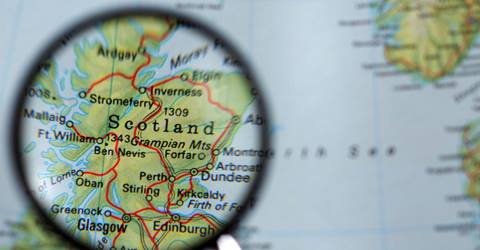The burden of proof is a fairly low encumbrance for the mainstream media in Scotland compared to alternative sources. No, let’s put this the other way around. For alternative information sources such as Wings Over Scotland and, if we may be so bold, the Scottish Economic Analysis Unit the burden of proof is a very high bar when compared to the MSM. Stuart Campbell can divide opinion from time to time but the certainty that one has when reading a piece on Wings is that he has got his facts absolutely straight before attacking his keyboard. Here at Scottish EAU we strive for the same integrity.
However the MSM feels justified in regularly trotting out pseudo-academic stories which have no justification in fact whatsoever. On these blog we refer to this as intellectual incoherence as that is just about as close to the real definition as we can manage. The modus operandi of the typical intellectually incoherent journalist is to take a seemingly reasonable premise and then contort unimaginably it to fit the MSM agenda.
The political feature writers across the MSM have been at it for years and sometimes the results are so hilariously transparent as to be worthy of praise for comedic value.
Please stand up Andrew Liddle of the Courier. Now, I have to confess to not being a reader of the Courier at all. In fact, I have never knowingly read any article by Mr. Liddle. At least that was the case until Thursday 12th February 2016.
Wings Over Scotland highlighted an article by Liddle in yesterday’s Courier. Probably the best way to start is to quote Liddle verbatim:
“The Courier can today reveal how Brussels rules could allow Scotland to stay in the European Union even if voters in England and Wales back Brexit.
“Senior officials have confirmed it would be possible to redraw the member state’s borders so only Scotland would be subject to EU treaties in the event of a Leave vote.
“Such a move would deal a hammer blow to pro-independence supporters who hope that Scotland ‘being dragged out of the EU against its will’ could trigger a second referendum on Scottish separation.”
The article then goes on at length to quote Professor Sionaidh Douglas-Scott of Queen Mary University of London and an assertion of hers that, “confirmed there is a ‘precedent’ for members to redefine what parts of their country are subject to EU rules and it may not even need a complicated treaty change.”
Yes, this is indeed the case.
Then Liddle interweaves the circumstances of how Greenland seceded from the EU whilst still remaining a part of Denmark with his narrative that Scotland could benefit from a similar deal. That’s an interesting position from an intellectual point of view. Until we consider that what Liddle indicates Professor Douglas-Scott is suggesting is a complete 180 degrees opposite of the 1985 Greenland Treaty.
“The Queen Mary University academic argues this could allow Scotland to remain and the rest of the UK to leave, if voters support Brexit south of the border,” which far from Scotland seceding from UK obligations to the EU would be, in fact, England and Wales seceding from EU obligations and leaving Scotland as the de jure United Kingdom in all matters related to the EU whilst the exercising of those obligations would, to all intents and purposes, remain within the de facto purview of Westminster – Scotland alone remains in the EU from the UK but London sets Scotland’s European agenda. What? How would that work? And that arrangement would require Westminster to totally ignore the outcome of a LEAVE vote and gerrymander an entirely new solution.
Confused? Well, you certainly should be as the intellectual incoherence is baffling. How could a senior and respected academic make such controversial statements and assumptions?
Except that if we read Liddle’s narrative closely we find that although he attributes specific quotes to Professor Douglas-Scott in her explanation of what EU member countries and their parts can do, nowhere in that narrative do we see one single mention from her of how this explicitly relates to Scotland and the UK. It is all written in the context of Denmark, Greenland and other specifics with no threat to Scotland, neither implicit nor explicit.
The intellectual incoherence appears to be singularly that of Andrew Liddle. I have to commend him on his writing style as he cunningly conflates a completely distinct and very dissimilar academic treatise with the consistent misinformation of his newspaper’s editorial line.
As I say, the burden of proof is high for the alternative information sources but a low encumbrance for the MSM so that’s that for Liddle and the Courier. Job done.
Except that when we took our responsibility seriously and looked more deeply into the subject matter to fulfil our requirements regarding our burden of proof we discovered some very interesting things relating to Liddle’s “hammer blow.”
All of the quotes attributed to Professor Douglas-Scott are taken directly from her briefing to the Scottish Parliament on the implications for Scotland of EU reform and the EU referendum of 8th December 2015. She does indeed mention the Greenland Treaty and some other bits and pieces, particularly involving what she refers to as “federacies,” specifically outlining arrangements in force in Germany, Austria and Finland.
What Liddle fails to mention is the Professor’s final flourish on Page 21 of her briefing. I shall quote in full:
“However, it is nonetheless the case that, if the UK proposed to radically alter its relationship with the EU then the Scottish Parliament could potentially veto any changes proposed by the UK Parliament that had a profound impact on its competences. These could include any changes resulting from the withdrawal of EU membership, which would have a significant impact on the competences of the Scottish Parliament.”
There might indeed be a hammer blow dealt but NOT to pro-independence supporters!
Liddle has cherry-picked this briefing paper without giving any reference to its true purpose and content. Furthermore he then ignores the headline conclusion to pursue his own agenda. This is as disingenuous as picking the parts out of a judge’s summing up of a court case from the losing side of the argument which he would indicate did not persuade him or the jury but then failing to report the actual verdict.
Shameful.
Just to avoid any doubt the full text of Professor Sionaidh Douglas-Scott’s briefing can be read by clicking here.
If you find this blog post useful and/or interesting please click on LIKE below. Thank you.




